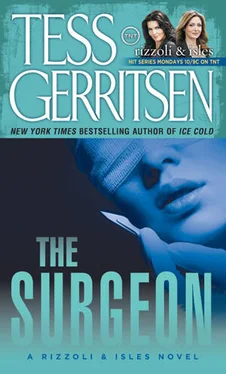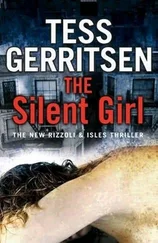Catherine said nothing.
“And that’s not all he planned to do,” continued Rizzoli.
Dear god, make her stop.
“He was going to mutilate you in the worst possible way. As he mutilated four other women in Georgia. He cut them open. Destroyed precisely what made them women.”
“That’s enough,” said Moore.
But Rizzoli was relentless. “It could have happened to you, Dr. Cordell.”
Catherine shook her head. “Why are you doing this?”
“Dr. Cordell, there is nothing I want more than to catch this man, and I would think you’d want to help us. You’d want to stop it from happening to other women.”
“This has nothing to do with me! Andrew Capra is dead . He’s been dead for two years.”
“Yes, I’ve read his autopsy report.”
“Well, I can guarantee he’s dead,” Catherine shot back. “Because I’m the one who blew that son of a bitch away.”
Moore and Rizzoli sat sweating in the car, warm air roaring from the AC vent. They’d been stuck in traffic for ten minutes, and the car was getting no cooler.
“Taxpayers get what they pay for,” said Rizzoli. “And this car’s a piece of junk.”
Moore shut off the AC and rolled down his window. The odor of hot pavement and auto exhaust blew into the car. Already he was bathed in perspiration. He didn’t know how Rizzoli could stand keeping her blazer on; he had shed his jacket the minute they’d stepped out of Pilgrim Medical Center and were enveloped in a heavy blanket of humidity. He knew she must be feeling the heat, because he saw sweat glistening on her upper lip, a lip that had probably never made the acquaintance of lipstick. Rizzoli was not bad-looking, but while other women might smooth on makeup or clip on earrings, Rizzoli seemed determined to downplay her own attractiveness. She wore grim dark suits that did not flatter her petite frame, and her hair was a careless mop of black curls. She was who she was, and either you accepted it or you could just go to hell. He understood why she’d adopted that up-yours attitude; she probably needed it to survive as a female cop. Rizzoli was, above all, a survivor.
Just as Catherine Cordell was a survivor. But Dr. Cordell had evolved a different strategy: Withdrawal. Distance. During the interview, he’d felt as though he were looking at her through frosted glass, so detached had she seemed.
It was that detachment that irked Rizzoli. “There’s something wrong with her,” she said. “Something’s missing in the emotions department.”
“She’s a trauma surgeon. She’s trained to keep her cool.”
“There’s cool, and then there’s ice. Two years ago she was tied down, raped, and almost gutted. And she’s so friggin’ calm about it now. It makes me wonder.”
Moore braked for a red light and sat staring at the gridlocked intersection. Sweat trickled down the small of his back. He did not function well in the heat; it made him feel sluggish and stupid. It made him long for summer’s end, for the purity of winter’s first snowfall….
“Hey,” said Rizzoli. “Are you listening?”
“She is tightly controlled,” he conceded. But not ice, he thought, remembering how Catherine Cordell’s hand had trembled as she gave him back the photos of the two women.
Back at his desk, he sipped lukewarm Coke and re-read the article printed a few weeks before in the Boston Globe : “Women Holding the Knife.” It featured three female surgeons in Boston — their triumphs and difficulties, the special problems they faced in their specialty. Of the three photos, Cordell’s was the most arresting. It was more than the fact she was attractive; it was her gaze, so proud and direct that it seemed to challenge the camera. The photo, like the article, reinforced the impression that this woman was in control of her life.
He set aside the article and sat thinking of how wrong first impressions can be. How easily pain can be masked by a smile, an upward tilting chin.
Now he opened a different file. Took a deep breath and re-read the Savannah police report on Dr. Andrew Capra.
Capra made his first known kill while he was a senior medical student at Emory University in Atlanta. The victim was Dora Ciccone, a twenty-two-year-old Emory graduate student, whose body was found tied to the bed in her off-campus apartment. Traces of the date-rape drug Rohypnol were found in her system on autopsy. Her apartment showed no signs of forced entry.
The victim had invited the killer into her home.
Once drugged, Dora Ciccone was tied to her bed with nylon cord, and her screams were muffled with duct tape. First the killer raped her. Then he proceeded to cut.
She was alive during the operation.
When he had completed the excision, and had taken his souvenir, he administered the coup de grace: a single deep slash across the neck, from left to right. Though the police had DNA from the killer’s semen, they had no leads. The investigation was complicated by the fact Dora was known as a party girl who liked to cruise the local bars and often brought home men she’d only just met.
On the night she died, the man she brought home was a medical student named Andrew Capra. But Capra’s name did not come to the attention of the police until three women had been slaughtered in the city of Savannah, two hundred miles away.
Finally, on a muggy night in June, the killings ended.
Thirty-one-year-old Catherine Cordell, the chief surgical resident in Savannah’s Riverland Hospital, was startled by someone knocking at her door. When she opened it, she found Andrew Capra, one of her surgery interns, standing on her porch. Earlier that day, in the hospital, she had reprimanded him about a mistake he’d made, and now he was desperate to find out how he could redeem himself. Could he please come in to talk about it?
Over a few beers, they’d reviewed Capra’s performance as an intern. All the errors he’d made, the patients he might have harmed because of his carelessness. She did not sugarcoat the truth: that Capra was failing and would not be allowed to finish the surgery program. At some point in the evening, Catherine left the room to use the toilet, then returned to resume the conversation and finish her beer.
When she regained consciousness, she found herself stripped naked and tied to the bed with nylon cord.
The police report described, in horrifying detail, the nightmare that followed.
Photographs taken of her in the hospital revealed a woman with haunted eyes, a bruised and horribly swollen cheek. What he saw, in these photos, was summed up in the generic word: victim .
It was not a word that applied to the eerily composed woman he had met today.
Now, re-reading Cordell’s statement, he could hear her voice in his head. The words no longer belonged to an anonymous victim, but to a woman whose face he knew.
I don’t know how I got my hand free. My wrist is all scraped now, so I must have pulled it through the cord. I’m sorry, but things aren’t clear in my mind. All I remember is reaching for the scalpel. Knowing that I had to get the scalpel off the tray. That I had to cut the cords, before Andrew came back….
I remember rolling toward the side of the bed. Falling half onto the floor and hitting my head. Then I was trying to find the gun. It’s my father’s gun. After the third woman was killed in Savannah, he insisted I keep it.
I remember reaching under my bed. Grabbing the gun. I remember footsteps, coming into the room. Then — I’m not sure. That must be when I shot him. Yes, that’s what I think happened. They told me I shot him twice. I guess it must be true.
Moore paused, mulling over the statement. Ballistics had confirmed that both bullets were fired from the weapon, registered to Catherine’s father, that was found lying beside the bed. Blood tests in the hospital confirmed the presence of Rohypnol, an amnesiac drug, in her bloodstream, so she might very well have blank spots in her memory. When Cordell was brought to the E.R., the doctors described her as confused, either from the drug or from a possible concussion. Only a heavy blow to the head could have left such a bruised and swollen face. She did not recall how or when she received that blow.
Читать дальше












